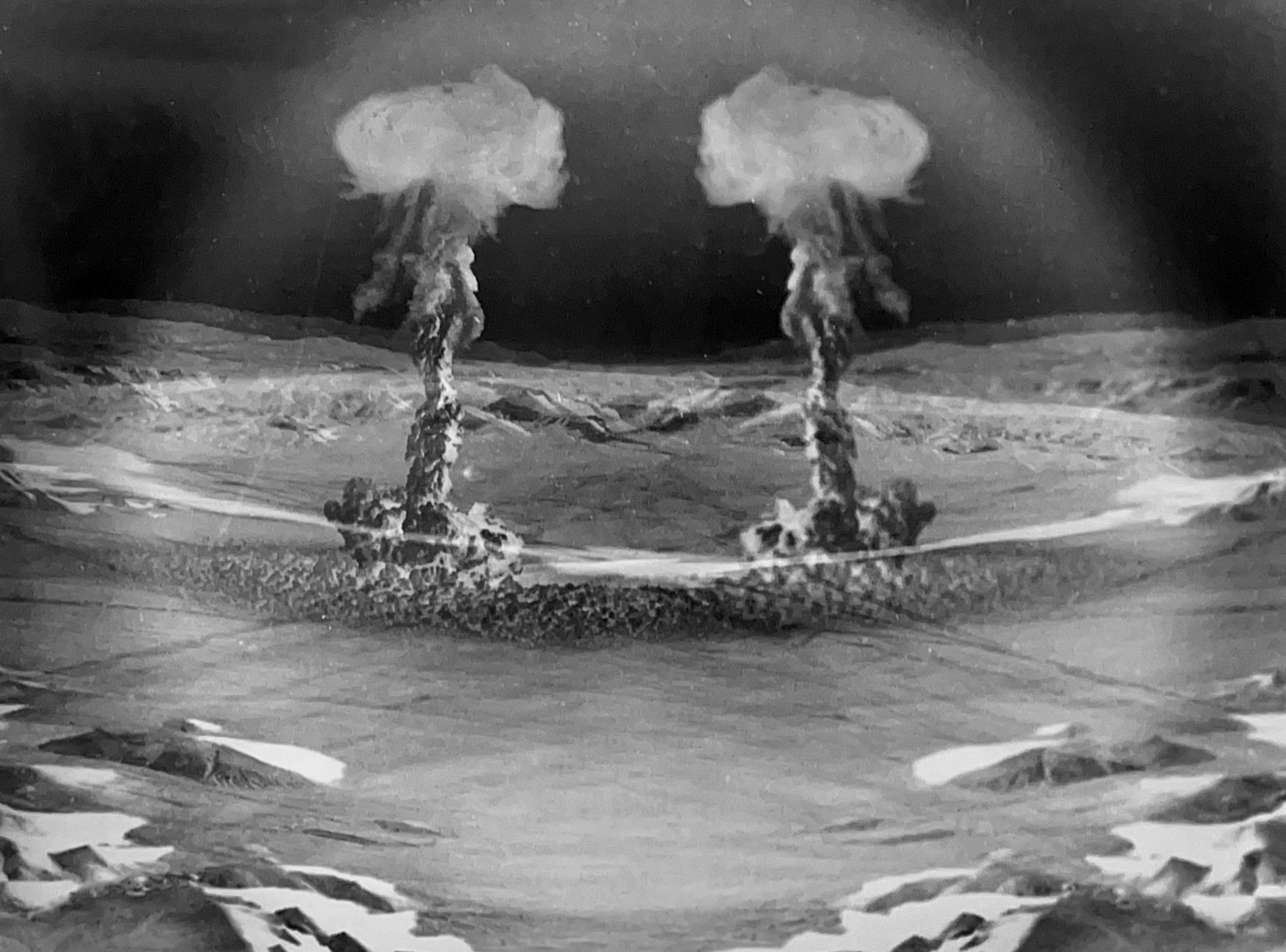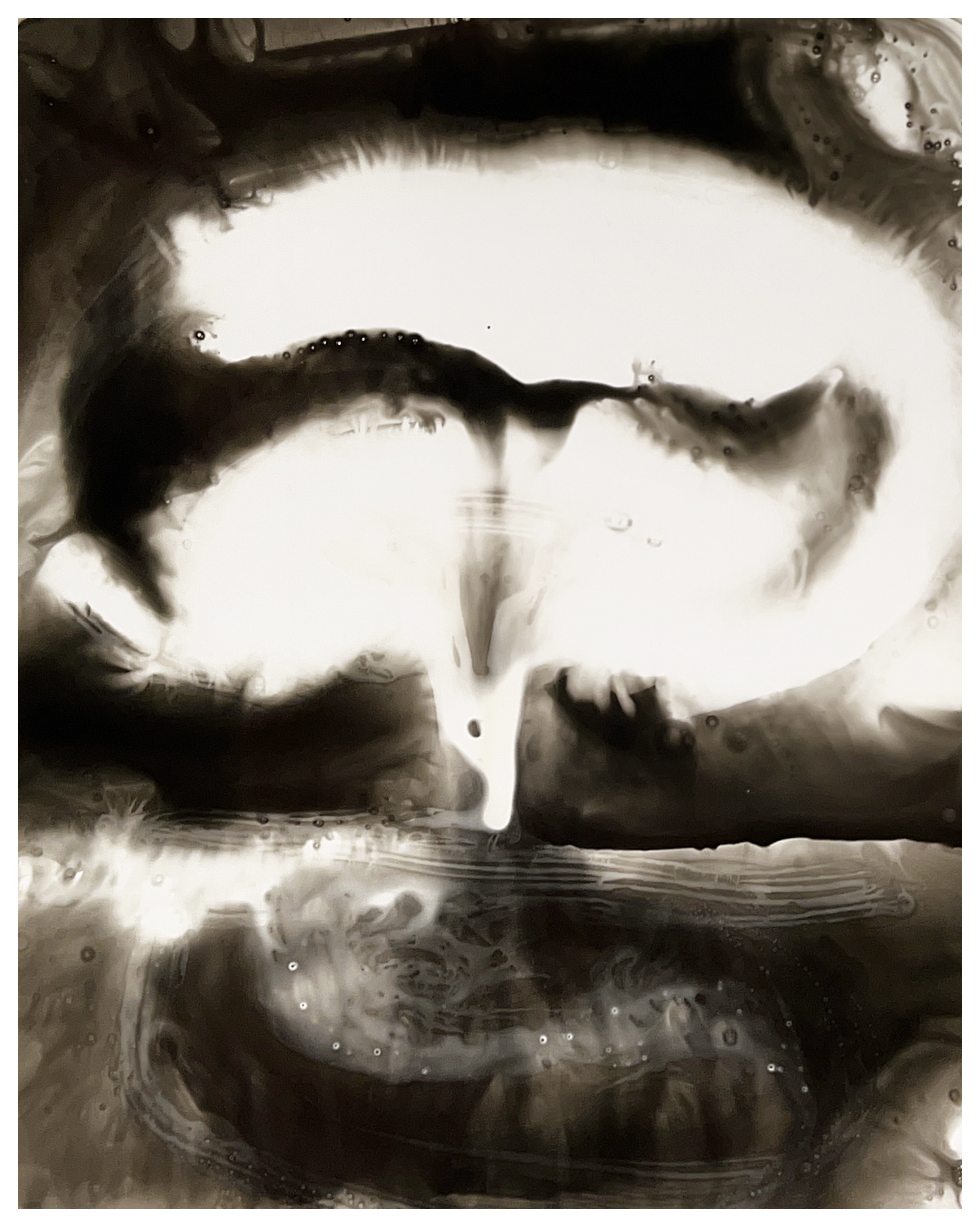Welcome to A People's Atlas of Nuclear Colorado
To experience the full richness of the Atlas, please view on desktop.
Navigating the Atlas
You may browse the Atlas by following the curated "paths" of information and interpretation provided by the editors. These paths roughly track the movement of radioactive materials from the earth, into weapons or energy sources, and then into unmanageable waste—along with the environmental, social, technical, and ethical ramifications of these processes. In addition to the stages of the production process, you may view in sequence the positivist, technocratic version of this story, or the often hidden or repressed shadow side to the industrial processing of nuclear materials.
Using the buttons on the left, you may also browse the Atlas's artworks and scholarly essays, access geolocated material on a map, and learn more about contributors to the project.
If you would like to contribute materials to the Atlas, please reach out to the editors: Sarah Kanouse (s.kanouse at northeastern.edu) and Shiloh Krupar (srk34 at georgetown.edu).
Cover Image by Shanna Merola, "An Invisible Yet Highly Energetic Form of Light," from Nuclear Winter.
Atlas design by Byse.
Funded by grants from Georgetown University and Northeastern University. Initial release September 2021.
Using the buttons on the left, you may also browse the Atlas's artworks and scholarly essays, access geolocated material on a map, and learn more about contributors to the project.
If you would like to contribute materials to the Atlas, please reach out to the editors: Sarah Kanouse (s.kanouse at northeastern.edu) and Shiloh Krupar (srk34 at georgetown.edu).
Cover Image by Shanna Merola, "An Invisible Yet Highly Energetic Form of Light," from Nuclear Winter.
Atlas design by Byse.
Funded by grants from Georgetown University and Northeastern University. Initial release September 2021.
Elin O'Hara Slavick, Dark Archive - Nuclear Test 8, 2022,
Artwork
Dark Archive is the title of a book-in-progress and a Fall 2022 solo exhibition at the University of Colorado, Colorado Springs that utilizes the Caltech Archive to: illuminate irradiated history; visualize the intersection of photography and science, image-making as a form of scientific process and discovery; reveal how research (mostly by white men) leads to the possibility of total annihilation through the development and deployment of nuclear power, weapons, and atomic bomb tests.
I did not know, before arriving to Caltech as the Huntington Art and Research Fellow, that the detonators for Little Boy and Fat Man, the atomic bombs dropped on Hiroshima and Nagasaki, were, in part, developed at Caltech. Many scientists at Caltech worked on the Manhattan Project, as did scientists and countless other workers across the country – all for the intensifying nuclear military-industrial complex. Finding a box of forgotten photographs – of Einstein, the Mars Landing, a public meeting of the eugenics organization The Human Betterment Foundation, scientific equipment and illustrations, architecture, babies in strollers and observatories – in a basement, I was struck by how the whole world could be imaged and fit into one box. Of course, it is not the whole world, but the world of Caltech, the prestigious California Institute of Technology in Pasadena, California, where over one million missiles were produced for WWII. The box was in a drawer in one of the many abandoned darkrooms. Using boxes of photographic paper that had been left and negatives, transparencies, and glass lantern slides from the Caltech Archives of men and machines, balloons over India, wind tunnels, cloud chambers, radiation labs, and nuclear tests, I make photographs to show connections between history, our present, and possible future.

Looking through the archives of famous men and finding sepia-toned photographs from Hiroshima of suffering victims and landscapes of rubble, mixed in with microscopic views of insects, a bomber plane loaded with a cloud chamber, and Atomic Energy Commission and Los Alamos Laboratory images of nuclear tests, I am convinced of several things: that it is no wonder there is so much cancer in the world with over 2,000 nuclear tests total worldwide (528 atmospheric/above-ground); that corporations, governments, and educational institutions work together against our (citizens) best interests in the name of science and technology, discovery and power; that image-making is essential in the process and aftermath; that most people do not understand the devastation that nuclear research, power, accidents, weapons, waste, and production have wrought. I am trying to make images that invite people to consider things they would rather ignore. Our government and military have bombed us, their own civilian population, for decades through nuclear testing. Impressive institutions, like Caltech, were at the toxic heart of the nuclear weapons complex.

While producing photographs from the archival material, I started to throw away boxes of outdated paper that would turn black if put into the developer without exposing it. However, I decided to paint an atomic mushroom cloud on a sheet of it, using fixer for whites and developer for blacks and gray (and sometimes brown and sepia tones due to chemical interactions). I was stunned by the luminosity and emotional impact of the very first chemical drawing and six hours later, I had made the first 30 chemical drawing-photographs of nuclear tests. They conjure skulls, brains, embryos, abortions, fetuses, Rorschach tests, trees, tornadoes, alien spacecraft, illuminated orbs of abstraction, eyes, organs, and toxic mushroom clouds that poison the earth, air, heavens, horizon, our bodies, those living downwind and those involved in the production of these spectacular experiments of radioactivity in the name of war and defense.

I made 528 chemical drawings of nuclear tests, one for each above-ground test that the world has conducted – 219 by Russia, 215 by the U.S., 50 by France, 23 by China, and 21 by the UK. I am also making photographs from Atomic Energy Commission and Los Alamos Laboratory negatives of nuclear tests, layering them in the enlarger, transforming a color positive into a haunting black and white negative impossibility. These images are only part of Dark Archive, a project that works to expose things kept in archives, once classified, in order to push us to imagine a better world, a world without nuclear power and weapons and the inevitable eternal waste. As Paul Virilio says, “When you build a sailing vessel, you guarantee a shipwreck.” Radical historian Howard Zinn once told me that if we do not imagine a nuclear-free world, it will never be. It is my hope that these images spark empathy and critical concern, interest and action towards an alternative use of knowledge, experience, humanity, data, science, and technology – not for and towards our total annihilation, but for a sustainable and possible future.
I did not know, before arriving to Caltech as the Huntington Art and Research Fellow, that the detonators for Little Boy and Fat Man, the atomic bombs dropped on Hiroshima and Nagasaki, were, in part, developed at Caltech. Many scientists at Caltech worked on the Manhattan Project, as did scientists and countless other workers across the country – all for the intensifying nuclear military-industrial complex. Finding a box of forgotten photographs – of Einstein, the Mars Landing, a public meeting of the eugenics organization The Human Betterment Foundation, scientific equipment and illustrations, architecture, babies in strollers and observatories – in a basement, I was struck by how the whole world could be imaged and fit into one box. Of course, it is not the whole world, but the world of Caltech, the prestigious California Institute of Technology in Pasadena, California, where over one million missiles were produced for WWII. The box was in a drawer in one of the many abandoned darkrooms. Using boxes of photographic paper that had been left and negatives, transparencies, and glass lantern slides from the Caltech Archives of men and machines, balloons over India, wind tunnels, cloud chambers, radiation labs, and nuclear tests, I make photographs to show connections between history, our present, and possible future.

Dark Archive - Double Test,
Looking through the archives of famous men and finding sepia-toned photographs from Hiroshima of suffering victims and landscapes of rubble, mixed in with microscopic views of insects, a bomber plane loaded with a cloud chamber, and Atomic Energy Commission and Los Alamos Laboratory images of nuclear tests, I am convinced of several things: that it is no wonder there is so much cancer in the world with over 2,000 nuclear tests total worldwide (528 atmospheric/above-ground); that corporations, governments, and educational institutions work together against our (citizens) best interests in the name of science and technology, discovery and power; that image-making is essential in the process and aftermath; that most people do not understand the devastation that nuclear research, power, accidents, weapons, waste, and production have wrought. I am trying to make images that invite people to consider things they would rather ignore. Our government and military have bombed us, their own civilian population, for decades through nuclear testing. Impressive institutions, like Caltech, were at the toxic heart of the nuclear weapons complex.

Elin O'Hara Slavick, Dark Archive - Nuclear Test 3, 2022,
While producing photographs from the archival material, I started to throw away boxes of outdated paper that would turn black if put into the developer without exposing it. However, I decided to paint an atomic mushroom cloud on a sheet of it, using fixer for whites and developer for blacks and gray (and sometimes brown and sepia tones due to chemical interactions). I was stunned by the luminosity and emotional impact of the very first chemical drawing and six hours later, I had made the first 30 chemical drawing-photographs of nuclear tests. They conjure skulls, brains, embryos, abortions, fetuses, Rorschach tests, trees, tornadoes, alien spacecraft, illuminated orbs of abstraction, eyes, organs, and toxic mushroom clouds that poison the earth, air, heavens, horizon, our bodies, those living downwind and those involved in the production of these spectacular experiments of radioactivity in the name of war and defense.

Elin O'Hara Slavick, Dark Archive - Nuclear Test 1, 2022,
I made 528 chemical drawings of nuclear tests, one for each above-ground test that the world has conducted – 219 by Russia, 215 by the U.S., 50 by France, 23 by China, and 21 by the UK. I am also making photographs from Atomic Energy Commission and Los Alamos Laboratory negatives of nuclear tests, layering them in the enlarger, transforming a color positive into a haunting black and white negative impossibility. These images are only part of Dark Archive, a project that works to expose things kept in archives, once classified, in order to push us to imagine a better world, a world without nuclear power and weapons and the inevitable eternal waste. As Paul Virilio says, “When you build a sailing vessel, you guarantee a shipwreck.” Radical historian Howard Zinn once told me that if we do not imagine a nuclear-free world, it will never be. It is my hope that these images spark empathy and critical concern, interest and action towards an alternative use of knowledge, experience, humanity, data, science, and technology – not for and towards our total annihilation, but for a sustainable and possible future.
Continue on "Production"